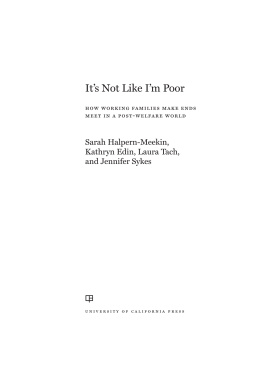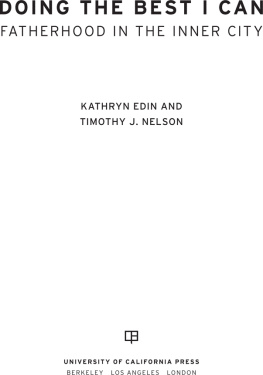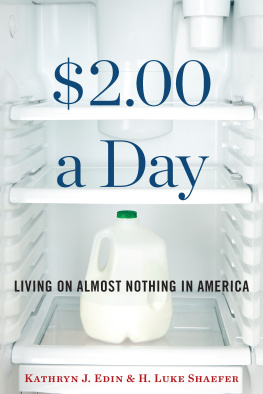A.1.
Acknowledgments
This book owes its existence to Kathryn Edin, Jeffrey Kling, and Ruby Mendenhalls project Investing in Enduring Resources with the EITC: Barriers and Pathways to Social Mobility, which was generously funded by the Ford Foundation (Kilolo Kijakazi, program officer). Several others were essential to the Investing in Enduring Resources with the EITC study. Peter Tufano and the research group at H&R Block, Roxanne Reddington-Wilde of Action for Boston Community Development (ABCD), Bostons Association of Community Organizations for Reform Now (ACORN), the East Boston Area Planning Action Council (APAC), and Susan Crowley made critical connections in securing data collection sites. Jennifer Sykes, the project director, and Gretchen Wright, the project coordinator, managed details and logistics. The Population Studies Center at the University of Pennsylvania provided an institutional home for the study. We offer special thanks to Herbert Smith and Irma Elo for their support. Our thanks go to David Ellwood for his visionary leadership in supporting the Inequality and Social Policy program and to Pamela Metz for deploying her extraordinary skills on its behalf. Interviews in Boston were conducted by April Baskin, Susan Crowley, Kathryn Edin, Sarah Halpern-Meekin, Vanessa Lopes, Eva Rosen, Sara Sternberg-Greene, Jennifer Sykes, Laura Tach, and Holly Wood. Assistance in preparing the data came from Gretchen Wright, a team of transcriptionists at Penn, and Jordan Parekh; Kristin Turney conducted related analyses of Consumer Expenditure Survey data.
Our work on the book benefited greatly from the suggestions and ideas of those around us. David T. Ellwood, Wendell Primus, and Janet Holtzblatt shared their insights into the policy story behind the modern EITC. H. Luke Shaefer was our go-to person for the best research on other means-tested programs. Christopher Jencks offered sage advice. Special thanks to those who commented on the book prospectus and/or manuscript: Lisa Adams, Paula England, Jeffrey Kling, Lawrence Mead, Stacey Oliker, Sharon Parrott, LaDonna Pavetti, Nils Ringe, Eldar Shafir, Margaret Sherraden, Michael Sherraden, Timothy Smeeding, and John Wancheck. Finally, the book never would have seen the light of day without our editor, Naomi Schneider, and the editorial assistance of Barbara Kiviat, Jessica Matteson, Emily Parrott, Kathryn C. Reed, and Joanne Spitz. All the mistakes that remain are ours.
Finally, Sarah, Laura, and Jen would like to thank Kathy for including us on this journey. At the start, we were all in graduate school. Now, three graduations, five babies, and seven years later, weve finished the book!
Introduction
February means snow in Boston, and this year is no exceptionnearly two feet of it last weekend and another three to six inches today. City workers in orange vests use snow blowers and shovels to dig out storm drains, while residents shovels sit ready to clear the stoops and sidewalks once more.
Among East Bostons working poor, however, February means more than just snowfall. Indeed, despite the dreary weather, it is the most eagerly anticipated month of the yearsome say that its even better than Christmas. And it is this keen sense of anticipation that drives Toni Patturelli out of her modest triple-deckerthree apartments stacked one on top of the otheron a day like today, and onto the #120 bus, which runs north from Maverick Station along Meridian Street to Central Squarethe hub of the neighborhoods commercial activity.
Retracing the route Toni has taken each February for an entire decade, we note the hairdressers, barbershops, cell phone stores, mom-and-pop grocers, realty companies, nail salons, and ethnic restaurants jam-packed along Meridian Street and lining Central Square, all vying for the attention of any potential customer passing by. But among all these storefronts, one proprietor on Bennington Street is perhaps the most aggressive. Its vivid green signs have been mounted on wire standards, like political campaign posters, and planted in the snowdrifts in front of the door, announcing, Were Open! The windows are filled with more bright signs of welcome: FREE SECOND LOOK REVIEW: WE FIND MONEY THAT OTHERS MISS; WALK-INS WELCOME; GET MONEY IN MINUTES.
There is clearly business worth fighting for herewe count six other businesses offering the same service within a two-block radius. Not surprisingly, some advertise only in SpanishRAPIDO refundsno doubt aware of the fact that Latinos have begun to outnumber the white population in this island neighborhood of roughly forty thousand residents. Beyond the glass door of the Bennington Avenue storefront are the offices of H&R Block, the well-known tax preparation service. Its bright and cheery orange interior contrasts nicely with the brilliant green signage. A half-dozen Dr. Seuss books are arranged on the window seat in the waiting area, signaling a welcome to parents of young children. A smiling bilingual receptionist, a gregarious manager, and several professionally dressed tax specialists are on hand.
For much of the year, this H&R Block office escapes notice. But each February, when taxpayers who anticipate a refund file their taxes, it is among the busiest places in the neighborhood. Toni knows the drill and has made sure to bring everything that she needs: her government-issued ID, the W-2 form from the catering company where she works, and her kids Social Security numbers. Just a few days from now, shell return to collect a refund check that includes her familys earned income tax credit (EITC). This year, the amount will equal nearly four months of her wages. And whats more, shell take pride in the fact that she earned the money. Shell call the check her refund, but the EITC actually is not a refund at allits the fulfillment of an American promise: if you work, you should not be poor.







